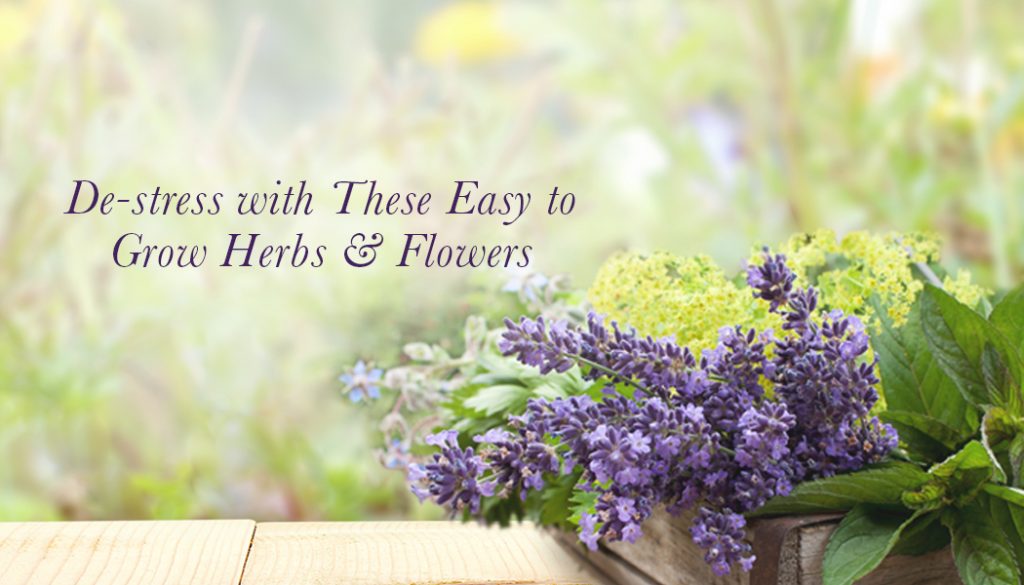PSYCHOLOGICAL STUDIES HAVE SHOWN HOW TENDING TO A GARDEN, HOWEVER SMALL IT MAY BE:
• Reduces stress and anxiety
• Improves concentration and clarity of thought
• Encourages contemplation, meditation, and creativity
When you cultivate a garden as a recreational distraction from your otherwise chaotic life, you take out time for physical exercise, and a much-needed digital detox. The somewhat fixed routine of sowing seeds, trimming and watering growing plants, and feeding (perhaps adopting!) visiting birds and animals makes for soul-food. It helps placate nagging nervousness and worry, because you are mindful of why you are indulging in this activity.
There are some herbs and flowers that Ayurveda places on a high pedestal, for their rejuvenating character. Include these in your therapeutic garden, for more daily healing and relaxation.
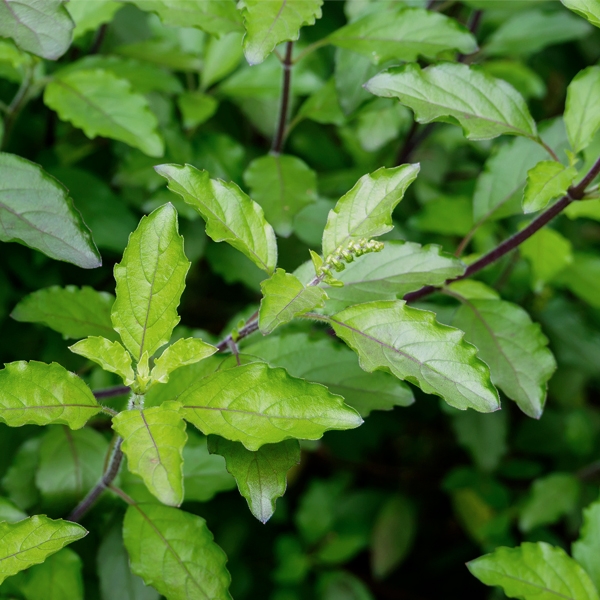
1) HOLY BASIL:
Our country has 3 indigenous varieties of Holy Basil, or Tulsi, also called the Queen of Herbs. Rama and Krishna Tulsi are named after Hindu deities. Vana of Vana Tulsi, connotes ‘Forest’. Vana Tulsi, that also grows in other parts of Asia and Africa, is known for its aromatic character. In taste, Rama Tulsi has a lighter, mellow taste, and is known for its cooling, soothing properties. Like the skin of the God its named after, Krishna Tulsi has dark green, almost purple leaves. It is a popular choice for herbal teas, because of its splendidly peppery taste.
Ayurveda identifies Tulsi as an extremely powerful, purifying, and emotionally anchoring adaptogen. It helps the human Mind & Body adapt its responses to the unpredictable and varying nature of stress triggers. Its Sattvic, or Transcendental, Pure, Life-Giving qualities, makes it ideal for garden spaces, for it purifies the surrounding environment, and protects against toxins and pollutants.
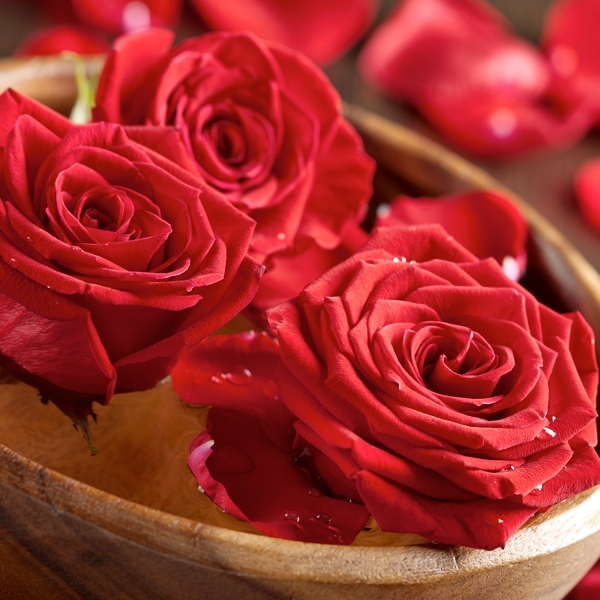
2) ROSE:
A favourite with garden enthusiasts, the Rose is available in a variety of delightful colours. The Rose is an ancient flower, almost 35 million years old; cherished and worshipped across ancient and contemporary cultures. It is also possibly the most respected floral in Ayurveda, for its ability to balance hormones and emotions internally. Rose Essence is famous for its antidepressant and de-stressing aroma.
In Ayurveda, Rose Water positively impacts Sadhaka Pitta, the sub-dosha of Pitta that governs emotional wellbeing, the heart, and the timely processing of emotions. For, it is when emotions are not ‘ventilated’ as they should, that the psychological turbulence throws the Mind-Body connection out of sync. Rose Water washes over Sadhaka Agni, or the digestive fire that ‘cooks’ (processes) emotions. But, instead of extinguishing, this Water maintains the ‘flickering’ and ‘flaming’ of the digestive Pitta ‘fire’ at optimum levels.
3) JASMINE:
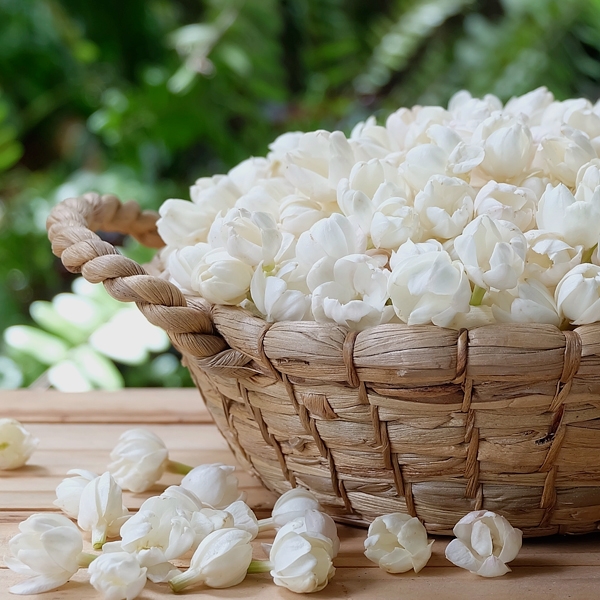
A favourite with Adinath Shiva himself, this white flower of joy spreads peace all around it. The particular variety known as ‘Queen of the Night’, is the Jasminum Sambac, because it blooms only at night-time; spreading its enigmatic, sensual fragrance effortlessly. The indigenous (Indian) name of Jasminum Sambac is Mogra.
Ayurveda regards both, Sambac, and Jasminum Grandiflora, which blooms during the day, as Hrudya Gandha (‘Fragrance Pleasing to the Heart’). However, it accepts that Sambac (Mogra) is more impactful on the human olfactory system. Mogra, like Tulsi, is Sattvic. It dissipates anxiety and sadness, uplifts the spirits, and is believed to possess potent aphrodisiacal properties. It is also a popular anti-ageing ingredient in skincare and cosmetics, for its ability to hydrate and plump up skin, and smoothen out wrinkles and fine lines.
4) LAVENDER:
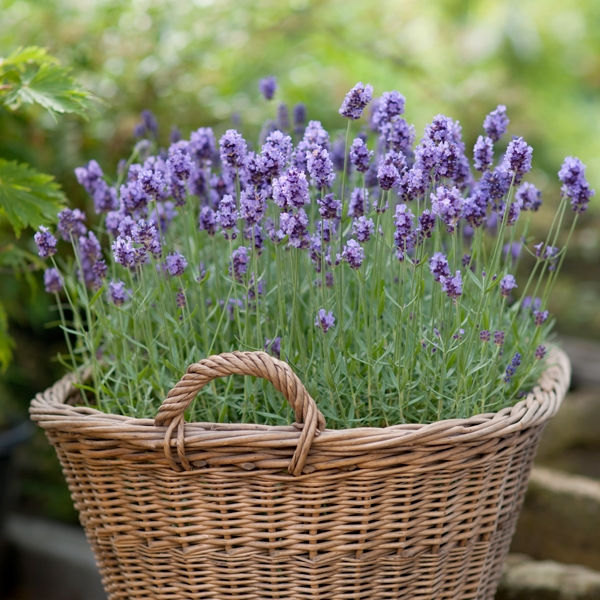
Lavender is actually a herb, because by botanical definition it lacks ‘woody’ stems. Like Rose, Lavender dates back to antiquity. It is around 2,500 years old, believed to be indigenous to India, the Middle East, and the Mediterranean. It gets its Latin name from Lavare (‘To Wash’). Its Essence has a longstanding reputation for cleansing, protection, and purification, because of its antibacterial, antioxidant, and antiseptic nature.
In Ayurveda, Ojas is described as the vital Life-Giving Nectar, like Prana. Lavender in all its forms encourages healthy production of Ojas, for the maintenance of physical and psychological vigour. From an Aromatherapy perspective, it bolsters the digestive and immune systems, helps recalibrate the body’s biological clock, and regulates the expression of moods and emotions.
As the complexity of today’s urban concrete jungles increase, it is becoming imperative to find everyday ways of connecting with Nature, for the sake of a conscious, grounded, and emotionally placid existence.
